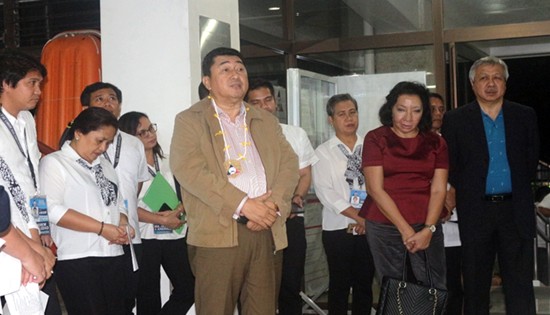
Usec.
Paras delivering his message during the Meet and Greet with
the NMP employees on 23 April 2018. |
NMP remains with
the Department of Labor and Employment (DOLE)
Press Release
April 30, 2018
TACLOBAN CITY – “We
have heard in the past that there was an attempt on the part of the
Department of Transportation (DOTr) to absorb NMP but fortunately
with the charm of Assistant Secretary Joji V. Aragon we were able to
convince the DOTr through Undersecretary Felipe A. Judan that NMP
should remain as part of the human capital development rather than
as part merely of the shipping and transportation or whatever the
DOTr has planned”, says Undersecretary Jacinto V. Paras of the Human
Capital Development, Legislative and Media Affairs, and
Administrative Services Cluster of DOLE.
This was the categorical
statement of Usec. Paras during the Meet and Greet with the
employees of the National Maritime Polytechnic (NMP) on 23 April
2018.
Usec. Paras stressed that
NMP should continue to remain with DOLE, as the NMP’s clientele, the
Filipino seafarers, are part of the workforce of the country. The
NMP contributes to the attainment of the DOLE’s agenda on Human
Capital Development, with the training and research it conducts that
ensures the Filipino seafarers to acquire the knowledge and skills
required of them to become globally competitive in the international
maritime labor market.
He also emphasized the
need for NMP to move forward and to be true to its mandate as
underscored in Presidential Decree No. 1369. NMP has to focus in
offering specialization and upgrading courses for both licensed
officers and ratings and conducting researches and studies on the
latest maritime technologies and other related matters for the
maritime industry.
Based on the above
premise, a paradigm- shift is needed from NMP to come up with a new
and true direction as mandated by the law. As such, a series of
strategic planning and workshop will be conducted in May 2018.
Meanwhile, NMP continues
to upgrade its facilities and provide maritime trainings required
pursuant to the Standards of Training, Certification, and
Watchkeeping for Seafarers (STCW) Convention as amended in 2010
including value-adding courses towards improving the qualifications
of Filipino seafarers for their employment acceptability and
enhanced competitiveness.
Those interested to take
NMP training programs may visit the NMP website (www.nm.gov.ph) and
its facebook page (www.facebook.com/nmptrainingcenter) where all
related information on NMP trainings are available.
K-12 recipients utilizes
new school buildings
By
DPWH 2nd LED
April 30, 2018
CARIGARA, Leyte – Recipients of the K-12 program of the Department
of Education (DepEd) can now utilize the 27 school building projects
that have been completed by the Department of Public Works and
Highways (DPWH) Leyte Second District Engineering Office.
A total of P466.48 million has been allocated for the construction
of these school buildings under the Basic Educational Facilities
Fund (BEFF) of the DepEd.
These school building projects were built in the towns of Barugo,
Burauen, Capoocan, Carigara, Dagami, Dulag, Jaro, Julita, La Paz,
Mac Arthur, Mayorga, Pastrana, and Tunga.
According to District Engineer Carlos G. Veloso, these projects were
implemented to support the education program of the government and
accommodate the increasing number of enrollees in the different
towns of Leyte’s second district.
He added that it is guaranteed that the quality standards of these
new school buildings comply with the National Structural Code of the
Philippines that ensures reliability and calamity resiliency of the
infrastructures.
Moreover, the BEFF is an annual budget of the DepEd for its School
Building Program to address classroom shortage, improvements and
maintenance of school facilities.
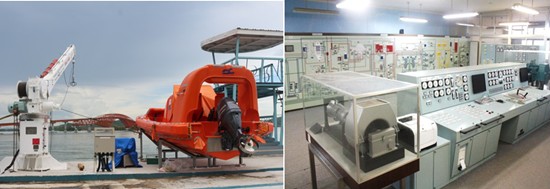
JICA
donated equipment for the conduct of PFRB (left) and ERS
(right). |
NMP’s two additional
training courses accredited by MARINA
Press Release
April 27, 2018
TACLOBAN CITY – Two (2) additional training courses of the National
Maritime Polytechnic (NMP), a government controlled and operated
maritime training and research institution with principal address
located at Brgy. Cabalawan, Tacloban City, have been duly accredited
by the Maritime Industry Authority (MARINA), namely: Proficiency in
Fast Rescue Boats (PFRB) and Engine Room Simulator (ERS).
It can be recalled that NMP submitted its application for
accreditation of the said courses last 20 July 2017. MARINA
conducted its initial inspection last 23-24 October 2017 and issued
a corresponding Notice of Deficiencies on 13 November 2017.
NMP submitted its compliance to the deficiencies noted by the MARINA
on 22 December 2017. In order to validate if indeed the deficiencies
noted were been duly rectified, MARINA conducted a re-inspection on
23-24 January 2018.
As per formal letter received from MARINA dated 10 April 2018, NMP
was granted full course approval of two (2) additional courses valid
for a period of three (3) years along with the accreditation of
instructors, assessors and supervisors who will be handling the said
courses.
During the said period, announced and unannounced visits will be
made by MARINA STCW Office or its duly authorized representatives to
ascertain NMP’s compliance with the MARINA’s rules and regulations.
NMP is required to submit the records of review and validation of
the aforementioned courses within six (6) months from the date of
its conduct. Moreover, the records of implementation of corrective
actions for audit results both internal and external, records of
review and validation of the courses including the assessment and
statistical record of trainees enrolled / certificated must be made
available during the conduct of monitoring.
Further, NMP is required to revise and align the course package of
the above-mentioned courses to the new standards once same have been
duly issued by MARINA.
MARINA’s approval ensures that the courses are designed and
structured in accordance with the standards of competence prescribed
under the Standards of Training, Certification and Watchkeeping for
Seafarers (STCW 1978), as amended in 2010.
PFRB is open to all seafarers who have completed the Basic Training
course while the ERS is open to both operational and management
level marine engine officers.
Upon successful completion of the above courses, the
seafarer-trainees will be able to:
1. Proficiency in Fast Rescue Boats (PFRB) - Understand the
construction, maintenance, repair and outfitting of fast rescue
boats; take charge of the launching equipment and appliance as
commonly fitted, during launching and recovery; take charge of the
fast rescue boat as commonly fitted, during launching and recovery;
take charge of a fast rescue boat after launching; and operate a
fast rescue boat engine.
2. Engine Room Simulator (ERS) - Familiarize the use of
instrumentation and controls extensive use in the engine rooms of
modern merchant ships; understand and be aware of the correct
watchkeeping procedures; understand the way in which machinery units
are interdependent; identify operational problems and techniques in
troubleshooting; make decisions to promote the safety and efficiency
of an operational plant; improve managerial skills particularly in
voyage planning, machinery systems and time and resource management;
and recognize the importance of value-added qualities to carry out
and lead a harmonious engine room teamwork.
Meanwhile, NMP continues to upgrade its facilities and provide
maritime trainings required pursuant to the STCW Convention as
amended in 2010 including value-adding courses towards improving the
qualifications of Filipino seafarers for their employment
acceptability and enhanced competitiveness. It also regularly
conducts maritime studies to come up with policies for the
improvement of the manpower sector of the industry.
Those interested to take NMP training programs may visit the NMP
website (www.nm.gov.ph) and its facebook page (www.facebook.com/nmptrainingcenter)
where all related information on NMP trainings are available.
ESSU wins over
LNU in the DILG-8 Federalism Debates
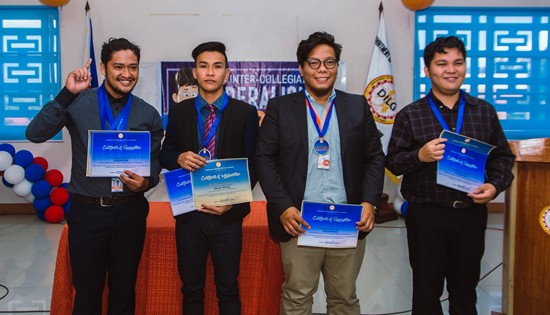
Press Release
April 26, 2018
TACLOBAN CITY – A
team from Eastern Samar State University (ESSU) bested their
counterparts from the Leyte Normal University (LNU) in the
championship match of the Intercollegiate Federalism Debates led by
the Department of the Interior and Local Government (DILG) on April
24, 2018 at the DILG-8 Regional Training Center, Tacloban City.
DILG Regional Director
Marivel C. Sacendoncillo bared that ESSU’s Jeric Ueno Montes also
won as Best Debater and Best Speaker. Aside from Montes, other team
members were Wences Alfon Café as first speaker, Joseph Jay Ayon as
second speaker and Christian Daniel Campomanes as Researcher, with
Ma. Teresita Quillo and Minerva Acedillo as coaches.
LNU which was tasked with
the affirmative side of the proposition, “Resolved that the country
shall adopt a federal form of government”, was represented by
Raymond Enriquez (1st Speaker), Larry Mark Orbong (2nd Speaker), Kay
Ann Torre (3rd Speaker) and Ave Maria Elizabeth Nacman as Researcher
with Charles Abanilla and Ara Joy Pacoma as coaches.
The Integrated Bar of the
Philippines (IBP) Leyte Chapter led by Atty. Leo Giron as program
partner brought in its big guns, with Judge Tarcelo A. Sabarre Jr.
(Regional Trial Court Branch 30), Judge Wenifredo C. Cuaton (RTC
Branch 11) and Judge Mario O. Quinit (RTC Branch 17) as adjudicators
for the championship.
According to Director
Sacendoncillo, the Tacloban leg of the debate series was broadcast
live over DYVL AksyonRadyo 819 KHz and streamed live over DILG
Region 8 Facebook Page. A delayed broadcast is set for showing over
IBC 6 Leyte. The championship culminated a series of 10 provincial
elimination matches, 4 quarterfinals matches and 2 semifinal matches
that were joined by some of the biggest colleges and universities in
the region.
The champion team received
a plaque, medals, certificates and P20,000 cash, while the 1st
runner-up team likewise received a plaque, medals, certificates and
P10,000 cash. A plaque of appreciation was presented to IBP-Leyte
chapter as program partner. Certificates of appreciation were
presented to DYVL and Prof. Arvin de Veyra, the moderator.
Meanwhile each team of
semifinalists from Visayas State University (VSU) and Samar College
(SC) was awarded medals, certificates, and P5,000 cash prizes during
the previous day’s awarding rites. The debate series was made
possible through the support of the DILG Central Office and DILG
Local Government Academy.
DILG initiated the
collegiate debate championship as part of its information and
education campaign on federalism. It aimed to explain the concept of
federalism and related issues on constitutional change among young
people who compose majority of voters.
|
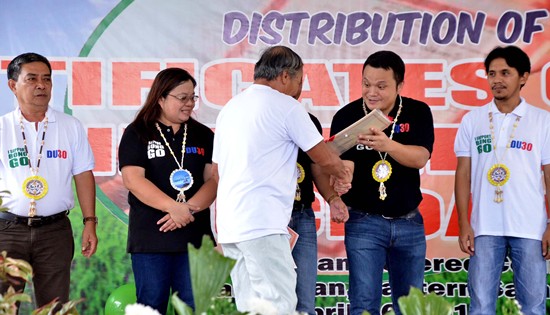
DAR
Undersecretary Karlo Bello hands certificate of land
ownership award (CLOA) to an agrarian reform beneficiary (ARB)
during CLOA distribution in San Julian, Eastern Samar.
Assisting him from left are Provincial Agrarian Reform
Program Officer Gilberto Apilado, Regional Director Sheila
Enciso and Mayor Dennis Estaron. |
320 “Estehanon”
farmers receive CLOAs from DAR
By
JOSE ALSMITH L. SORIA
April 23, 2018
SAN JULIAN, Eastern
Samar – Three hundred twenty farmer-tillers from 11 Eastern
Samar municipalities gathered at this town’s covered court on
Monday, April 16, to receive their certificates of land ownership
award (CLOAs) from the Department of Agrarian Reform (DAR).
DAR Undersecretary for
Field Operations Office Karlo Bello handed the 350 individual CLOAs
to the 320 agrarian reform beneficiaries (ARBs) as proof of
ownership to the land they are tilling.
Bello, speaking in Cebuano,
said to the ARBs, “you are now landowners. You are lucky because the
land (covered by the CLOAs) is a government-owned land (GOL). You
are not going to pay amortization.” But he stressed to them their
obligation to pay taxes being the owners now of the land.
The CLOAs covered an
aggregate area of 617.9 hectares of agricultural land situated in
the municipalities of Lawaan (32.3 hectares), Balanggiga (19
hectares), Giporlos (27.7 hectares), Quinapondan (19.2 hectares),
Salcedo (22.8 hectares), Dolores (33.8 hectares), Can-avid (18.7
hectares), Borongan (6.4 hectares), Maydolong (76.5 hectares),
Balangkayan (3.9 hectares) and San Julian (357.2 hectares).
Regional Director Sheila
Enciso advised the ARBs to take care of their awarded land because
the DAR personnel risked their lives in covering these lands under
the Comprehensive Agrarian Reform Program (CARP) so they could be
distributed to them.
Brothers Geronimo and
Tomas Batula Jr. from Maydolong, both received CLOAs, could not hide
their happiness. According to them they had been waiting for their
land titles for the past 10 years. They can’t believe that the
document is already in their hands.
Spouses Argie and Maureen
Osias from San Julian, brought with them their two children to
celebrate the occasion. According to Argie, they derive income from
the 2.5 hectares planted to rice and coconut that was awarded to
them.
Remedios Guardiana from
San Julian though thankful for finally receiving her CLOA, asked
that they also be blessed with support services which is part of the
implementation of CARP; while 89-year old Delfina Apita from Dolores
was just silent but obviously happy with the sweet smile in her
face.
DAR-Eastern Samar chief of
the Legal Division Atty. Brian Lassiter reminded the ARBs during the
said occasion of their obligations, responsibilities and prohibited
acts as well as rights and privileges, emphasizing not to sell their
awarded lands within 10 years.
Further, Provincial
Agrarian Reform Program Officer Gilberto Apilado encouraged them to
join agrarian reform beneficiaries organizations (ARBOs) to be able
to avail of the various support services extended by DAR.
Meanwhile, Mayor Dennis
Estaron thanked DAR not only for choosing this municipality to be
the venue of this activity but for uplifting the quality of life of
the farmers wherein San Julian has the most number of recipients.
Likewise, He thanked DAR
for the rural infrastructure projects implemented in his
municipality. This town has been a recipient of four farm-to-market
roads and an agricultural warehouse, all implemented under the
Agrarian Reform Communities Project (ARCP).
|
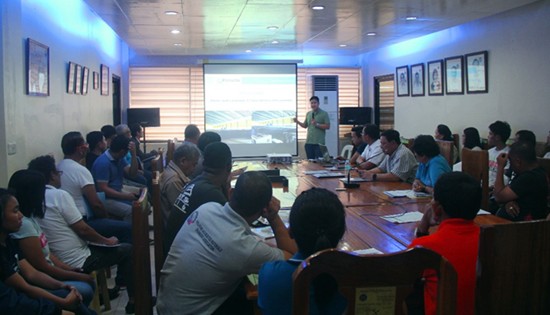
Polyvinyl
Chloride (PVC) Sheet Piles Orientation held at Samar First
District Engineering Office (SFDEO) conference room. |
DPWH-Samar 1
welcomes eco-friendly innovation in infrastructure projects
By
BON JOSEPH N. ASTILLA
April 20, 2018
CALBAYOG CITY –
Samar First District Engineering Office (SFDEO) held an orientation
on a new innovative material called Polyvinyl Chloride (PVC) sheet
piles at the Samar First conference room, on April 19, 2018.
Attended by
representatives from District Engineering Offices (DEOs) of Samar
First, Northern Samar First and Second, and construction firms such
as B. Vicencio Builders Inc., ACME Builders Corp, Victoria CSDC, and
ESD Cruz Construction and Supply, the orientation ushers the use of
Polyvinyl Chloride (PVC) sheet piles as an excellent alternative to
steel sheet piles used in infrastructure projects.
District Engineer Alvin A.
Ignacio of Samar First invites people from Pietrucha Manufacturing
Philippines Inc. to talk about this innovation. Mr. Raymond
Tenchavez, Business Management Manager of Pietrucha, claims that PVC
sheet piles come with a variety of applications as well as its own
advantages.
It is light, easy and
simpler to install with the use of standard tools compared to other
sheet piles of this type thanks to the unique flat surface project.
The product contains material obtained from the recycling of
structural PVC with the possibility for further processing serving
as an ecological solution. Long term protection is guaranteed
without the need of maintenance due to the material is completely
resistant to bio-corrosion, rust, cracking, seawater and uv rays.
The total savings in material and installation reach more than 30%
relative to steel sheet piles.
PVC sheet piles can be
used in the regulation of beds of rivers, canals (i.e. irrigation,
channels) or reservoirs; as retaining walls, for securing
excavations, landslides and slopes; as leakproof walls, for
shielding limiting groundwater infiltration; building and improving
dykes; and securing places with a variable water level and flood
banks.
PVC sheet piles prove to
be an ecological and cheap, maintenance-free solution, designed for
many years of use.
|
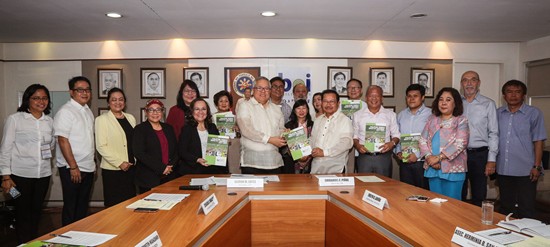
DTI Secretary Ramon M. Lopez and DA
Secretary Emmanuel F. Piñol sign the Philippine Rubber
Industry Roadmap 2017-2022. |
DTI, DA lead
efforts to strengthen PH rubber industry
By
DTI- OSEC-PRU
April 17, 2018
MAKATI – The
Department of Trade and Industry (DTI) and the Department of
Agriculture (DA) led the inter-agency signing of the Joint Statement
of Commitment for the “Philippine Rubber Industry Roadmap 2017-2022”
on 16 April 2018.
“The cluster approach
[that addresses the gaps and opportunities in the entire value chain
from the rubber production to processing and manufacturing of
finished products] is the way to go,” said DTI Secretary Ramon M.
Lopez. “This industry is critical in helping achieve President
Duterte’s vision of real inclusive growth since the rubber
production sector involves over 55,000 small farmers/growers.”
Ninety percent of the
rubber farmers in the country are small growers, most are from the
Mindanao region – Zamboanga Peninsula, SOCCSKSARGEN, and ARMM.
“DTI is committed to
expand market and processing opportunities for their products by
bringing in more investors on rubber processing and rubber-based
products, like tire companies, and linking them with the local
rubber suppliers,” the trade chief added. He also said Philippine
(PH) rubber can be used for rubberized asphalt for road projects in
the government’s “Build Build Build” program.
Meanwhile, DA Secretary
Emmanuel F. Piñol said that rubber has a crucial role in the
reformatting of the PH agriculture plan.
“The agricultural areas
I’ve visited suffer from the same problems: soil erosion and
landslides. These are indications of poor agricultural planning –
where farmers are planting crops where we should be planting rubber
trees,” Sec. Piñol said.
The roadmap outlines steps
in the following aspects of rubber production: (1) Production &
Productivity Improvement; (2) Processing and Manufacturing; (3)
Domestic and Export Marketing, (4) Research, Development and
Extension; (5) Finance and Investment Promotion; and (5)
Information, Policy Formulation and Advocacy.
Aside from the DTI and DA,
the inter-agency cluster consists of the departments of Science and
Technology (DOST), Environment and Natural Resources (DENR), and
Agrarian Reform (DAR), as well as the Technical Education and Skills
Development Authority (TESDA), the Mindanao Development Authority (MinDA),
the Philippine Rubber Industries Association (PRIA), the Philippine
Rubber Farmers Association (PRFA), and the University of Southern
Mindanao (USM).
PH is currently a minor
producer of rubber, yielding 1% of the natural rubber in the world
as compared to top producers Indonesia and Thailand that produce 25%
and 34% of global production, respectively. Despite this, the PH
rubber industry is steadily growing – for the last quarter of 2017,
rubber production grew by 8.9% to 138.24 thousand MT from 126.94
thousand MT in the same quarter of 2016.